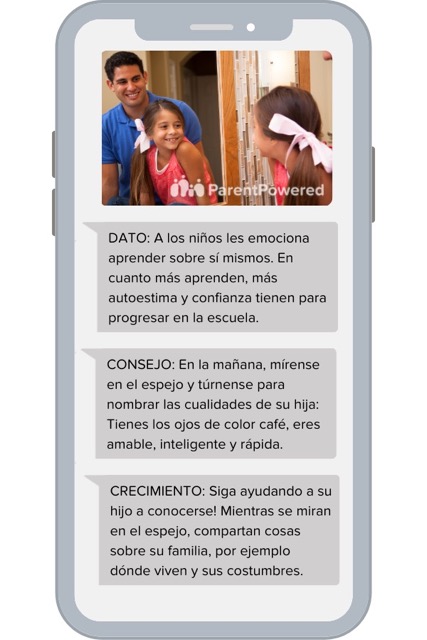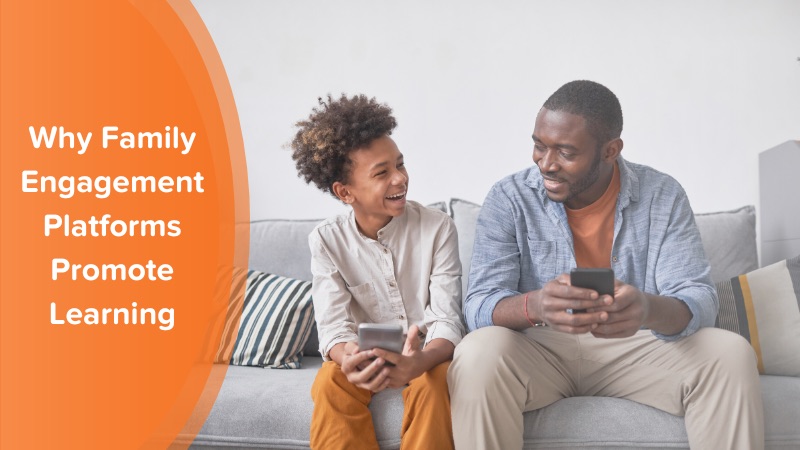By Megan Okrand, contributing writer
ParentSquare, ClassDojo, and Remind, oh my! Navigating the intricate realm of parent-school communication can indeed be a daunting task. Amidst the vast array of technologies at our disposal, distinguishing the genuinely effective tools for fostering meaningful family engagement and collaboration can pose a significant challenge.
Within this technological landscape, it’s vital not to lose sight of the ultimate goal: achieving effective engagement with families. Family engagement is the heartbeat of education, a fusion of school and family efforts aimed at nurturing a child’s growth. It hinges on communication, but not just any communication — communication that fosters understanding, trust, and shared objectives. That’s why family engagement platforms, not just communication platforms, are so important.
Communication vs. engagement: what’s the difference?
Now, you might be asking yourself, “What sets apart family engagement platforms from communications platforms?”
We’re so glad you asked!
Communication and family engagement platforms may sound similar, but they play vastly different roles in connecting schools and families. While both aim to foster family engagement, they vary significantly in their approach and impact.
Communication platforms
You can think of communication platforms as the town criers of the digital age. Much like how town criers would relay important news and announcements to the public, communication platforms are crucial connectors between schools and families. These solutions excel not only at promptly delivering key information (like school announcements and daily reports) to parents and caregivers, but also at providing an easy avenue for families to reach out to schools.
Challenges for Communication Platforms
While vital for parent communication and sharing valuable information, communication platforms can lack the depth of engagement that schools desire.
The challenge lies in harnessing these platforms to facilitate more profound, interactive experiences, rather than solely serving as conduits for information exchange. Schools often find themselves in a broadcasting role with these platforms, effectively sharing messages but perhaps not fully engaging in the rich, collaborative interactions that are possible.
And while these platforms allow for responses from parents, they often don’t fully exploit the potential for immersive and interactive dialogue that can significantly enhance engagement and bring learning home.

Yes, these platforms can deliver and receive important messages, but the magic of collaboration often remains elusive.
Additionally, when educators view these platforms predominantly as informational tools, it can inadvertently erect barriers, especially for families from historically marginalized backgrounds. This perception can lead to a one-dimensional approach that overlooks the unique needs and contributions of these families.
It’s crucial to move beyond a transactional approach to one that is more inclusive and inviting, encouraging active participation from all families.
Family engagement platforms
In contrast, family engagement platforms go beyond alert capabilities and mere information sharing; they facilitate collaboration and meaningful interactions for schools and families, creating a space for authentic engagement. They prioritize not only what is communicated but also how it is received and responded to, building stronger family-school partnerships.
Effective family engagement acts as a springboard for bringing education into the home environment. This transformation elevates families from merely receiving information to becoming active contributors in their child’s educational journey. Such a shift is vital for fostering a connected, responsive, and inclusive educational experience, where genuine communication and ongoing learning seamlessly merge, both in the classroom and at home.
Within this framework, family engagement platforms serve as catalysts for deeper understanding and collaboration. By providing parents with practical at-home learning activities, these platforms empower them with the support and confidence they need to actively engage in their child’s learning. This approach not only strengthens the bond between families and schools but also enriches students’ educational experiences, ensuring a more holistic and impactful learning journey.
ParentPowered’s family engagement platform, for example, enriches engagement by offering actionable insights, research-based activities, and learning extensions. In addition, ParentPowered provides educators with a plethora of resources, such as communication guides and family workshops, that help break down common barriers to family engagement. What’s more, the ParentPowered Dashboard allows schools to enroll their families in the program and assess its impact.
With ParentPowered, the emphasis isn’t on sending messages; it’s about helping parents take part in their student’s educational experience.
It is, of course, important to note that one type of approach is not inherently better than the other. Both are needed for schools to effectively engage with families.
The power of family engagement platforms
This is the 21st century. Technology is an integral part of our lives, and it’s here to stay. Embracing family engagement platforms doesn’t mean replacing human interaction; instead, it’s about enriching and strengthening it. These platforms serve as a means to streamline and enhance the connection between schools and families, paving the way for authentic collaboration that ultimately drives student success.
In any partnership, be it personal or professional, successful interactions are built on mutual exchange. Similarly, in the context of family-school relationships, two-way communication is central.
Research from the National Association for Family, School, and Community Engagement (NAFSCE) underscores that family engagement encompasses more than simple notification. Family engagement platforms serve as the conduit for this mutual exchange, amplifying the power of collaborative partnerships between schools and families.
Harnessing technology’s potential
Amid the ever-evolving landscape of education, technology has become a driving force reshaping family engagement. It acts as the bridge connecting parents, caregivers, teachers, and schools seamlessly.
Likewise, family engagement platforms have evolved, transforming into comprehensive systems that empower parents and caregivers. They can include features such as:
- Actionable Reports: Technology allows for the generation of actionable reports that provide insights into student outcomes, progress, and success. These reports empower parents with valuable insights into their child’s academic performance.
- Developmental Milestones: Some family engagement software provide parents with insights into their child’s developmental milestones, helping them understand and support their child’s growth effectively. A differentiator of ParentPowered is that our curricula break down complex concepts like milestones into simple, clear, and actionable steps for parents to take. This approach ensures parents are not only informed but also guided on how to apply this knowledge in practical, impactful ways.
- Individual Messages: Beyond group communications, some family engagement platforms can enable individualized messages between parents, teachers, and school staff. This personalized approach fosters a stronger sense of connection.
- Additional Capabilities: Family engagement platforms offer a wide range of additional capabilities beyond traditional communication tools. These include real-time academic updates, personalized learning resources, and feedback channels.
Through the power of text messages, ParentPowered provides continuous support to families, offering not just information about student learning and ways to get involved. These messages also provide caregivers with encouragement and motivation using a strengths-based approach that recognizes every parent has the capacity to make a positive impact on their child’s education.
Meaningful and authentic family engagement
Within the technological capabilities of family engagement platforms lies the nurturing ground for fostering authentic collaboration between parents, caregivers, educators, and students. These platforms serve as the catalyst for creating a conducive environment where both parties actively participate in a child’s educational journey.
You can consider the following factors when assessing family engagement platforms for your organization:
Collaborative Learning
The most impactful family engagement platforms encourage collaborative learning experiences. Parents and caregivers are not just passive recipients of information; they are active participants in their child’s education.

When families can access personalized learning resources, recommended activities, and educational materials, it ensures that the learning process extends beyond the classroom.
Strengths-Based Approach
Family engagement platforms often adopt a strengths-based approach. They provide parents with actionable insights and tips that empower them to support their child’s learning in everyday moments. This approach instills confidence in caregivers, giving them the belief that “I can do it!” as they actively contribute to their child’s growth.
Customized Support
Different children have different needs, and family engagement platforms acknowledge this diversity. They offer tailored support based on a child’s unique requirements. Whether it’s addressing the trauma of adverse childhood experiences (ACEs) by putting a protective factors framework into action or assisting families with children facing potential developmental delays, these platforms ensure that families receive the support they need.
ParentPowered’s Trauma-Informed program takes this commitment to a whole new level by providing a unique combination of protective factors-aligned messages, connections to concrete supports in times of need, family communication tools, and critical data.
Moreover, ParentPowered Personalized Learning provides families with a whole child curriculum informed by Ages & Stages Questionnaires®, Third Edition (ASQ®-3) screener results, ensuring a comprehensive approach to addressing each child’s specific developmental needs.
In essence, family engagement platforms not only need to facilitate communication but must also nurture authentic, meaningful, and collaborative partnerships between schools and families. When platforms empower caregivers to actively contribute to their child’s education, every student has the opportunity to succeed.
Promoting equity through family engagement
An equity-focused approach to family engagement in education recognizes the vital role it plays in addressing educational disparities. It underscores the significance of reaching not only engaged families but also underserved families and marginalized groups. The goal is to ensure that every family — regardless of their socioeconomic status, language proficiency, or cultural background — has equal access to educational resources and opportunities.
Family engagement platforms are instrumental in championing this approach. They serve as a bridge that connects schools and families, overcoming barriers that often hinder participation. These platforms provide a means to reach families who may have previously faced challenges in attending school events, meetings, or accessing critical information due to factors such as time constraints, language barriers, or transportation issues.
Advantages of utilizing family engagement platforms
When schools and educational institutions embrace family engagement platforms, especially those like ParentPowered that are specifically designed for inclusivity, they unlock a multitude of advantages. Further, they offer a pathway towards more effective and equitable engagement with families.
- Multilingual Support: Many family engagement platforms offer translated messages and resources. ParentPowered supports over 10 languages, which are translated professionally for both meaning and context — not just word-for-word! This feature is invaluable in bridging language barriers and ensuring that families with limited English proficiency can fully participate in their child’s education. (Imagine, for example, translating surveys in Spanish for Spanish-speaking families!)

- Accessibility: Equity-focused platforms are designed with accessibility in mind. They include features like screen readers and text-to-speech options, making them accessible to families with disabilities. Importantly, ParentPowered distinguishes itself by its cultural-responsiveness. This means the platform is not only physically accessible but also culturally inclusive, providing content that resonates with diverse families. This approach ensures comprehensive accessibility, addressing both physical and cognitive challenges, as well as cultural and linguistic diversity, ensuring that all families, regardless of their background or abilities, have equal opportunities to engage and benefit from the platform.
- Text Messages: Family engagement platforms that operate via text message allows families to access communication, updates, and resources on-the-go. This flexibility ensures that engagement can happen at a time and place that suits each family’s needs. ParentPowered utilizes texts to facilitate effective communication with families, enhancing their ability to stay connected and informed.
- Eliminating Barriers: These platforms remove traditional barriers to participation. Parents and caregivers no longer need to worry about childcare, transportation, or taking time off work to attend in-person workshops or meetings. This accessibility promotes a more inclusive and diverse engagement landscape.
Considerations for family engagement platforms
While family engagement platforms offer a multitude of advantages, it’s essential to approach their implementation thoughtfully. Here are a few considerations for you to explore:
- Cultural Sensitivity: Family engagement platforms should be culturally sensitive and adaptable to diverse cultural backgrounds. Consideration should be given to cultural norms, values, and communication preferences to ensure that the platform resonates with all families.
- User-Friendliness: The platform’s user-friendliness is paramount, as it should cater to families with varying levels of technical skills. A user-friendly interface ensures that families can easily navigate and utilize the platform to its full potential, promoting engagement.
- Customization: Platforms that allow for customization based on the unique needs of each school or district can promote equitable engagement. Schools should have the flexibility to tailor the platform to address specific challenges or opportunities within their community.
- Technical Support: Access to technical support is vital, especially for families with limited technical skills. Providing readily available technical assistance ensures that families can navigate and utilize the platform effectively. Support should be offered in multiple languages to accommodate diverse communities. Educators often face unique challenges and may require specialized assistance to effectively integrate these tools into their teaching methods. Offering dedicated technical support for educators ensures that they can troubleshoot, understand, and utilize the full range of platform features, enhancing the overall educational experience for students.
- Inclusivity of All Caregivers: Family engagement extends beyond biological parents. The platform should be designed to include all adult caregivers, such as grandparents, aunts, uncles, or family friends who are involved in a child’s upbringing. Recognizing the roles of these caregivers fosters a more inclusive environment.

Embrace equitable family engagement with ParentPowered
The journey toward enhanced family-school partnerships is within reach through the adoption of equitable, evidence-based family engagement platforms. These platforms offer the promise of creating meaningful connections between educators and families, transforming the landscape of education.
Technology has the potential to foster equitable engagement by reaching out to families from all socioeconomic backgrounds. It ensures that every family, regardless of their circumstances, can actively participate in their child’s education journey, ultimately strengthening family-school partnerships for the benefit of all students.
We encourage schools and educators to take a step forward, explore these technologies, and discover how they can strengthen relationships, support student success, and truly engage families in their child’s education journey.
To embark on this path of transformation, take the time to learn why the ParentPowered family engagement platform best supports educators.
About the author
Megan Okrand is a former High School History teacher turned writer taking her passion for education outside of the classroom and into the World Wide Web. Megan holds a master’s degree in secondary education and teaching from the University of Southern California as well as a master’s degree in art history, criticism, and conservation from University of North Carolina, Chapel Hill. Connect with her on LinkedIn.








